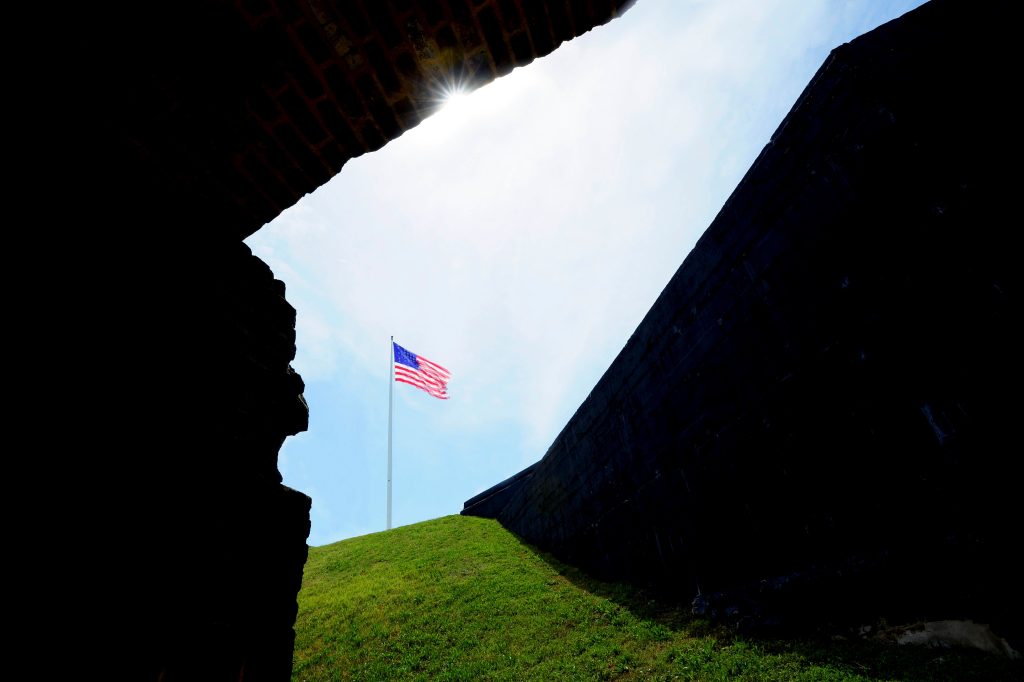A Thousand Words a Battle: Fort Sumter
Fort Sumter, Charleston, S.C.
April 12, 1861

The garrisons at Fort Pickens in Pensacola, Florida, and Fort Sumter in Charleston, South Carolina, did not meekly submit to the tide of secession. Around Fort Sumter, nestled in the cradle of secession, tensions ran the highest. Robert Anderson, the commander of the fort, disliked abolitionism, but he loved the Union more. He would not back down.
Abraham Lincoln was intent upon replenishing the fort’s dwindling supplies and sent a relief force. Jefferson Davis had to choose. If he backed down, the Confederacy might dissolve. If he fired, it would certainly start a war with an enemy superior in resources. To offset the North’s advantages, Davis hoped the states of Arkansas, Tennessee, North Carolina, Virginia, Missouri, Kentucky, and Maryland would refuse to invade the nascent Confederacy and join the rebellion.
After some deliberation, Davis chose war. On April 15, P.G.T. Beauregard, the Confederacy’s first general, sent an ultimatum to Anderson. Beauregard chose James Chesnut, a South Carolina politician, as his messenger. Chesnut had dinner with his wife, Mary, before he left to see Anderson. That night, Mary wrote:
I do not pretend to go to sleep. How can I? If Anderson does not accept terms at four, the orders are, he shall be fired upon. I count four, St. Michael’s bells chime out and I begin to hope. At half -past four the heavy booming of a cannon. I sprang out of bed, and on my knees prostrate I prayed as I never prayed before.
There was a sound of stir all over the house, pattering of feet in the corridors. All seemed hurrying one way. I put on my double-gown and a shawl and went, too. It as to the housetop. The shells were bursting. In the dark I heard a man say, “Waste of ammunition.” I knew my husband was rowing about in a boat somewhere in that dark bay, and that the shells were roofing it over, bursting toward the fort. If Anderson was obstinate, Colonel Chesnut was to order the fort on one side to open fire. Certainly fire had begun. The regular roar of the cannon, there it was. And who could tell what each volley accomplished of death and destruction?
The women were wild there on the housetop. Prayers came from the women and imprecations from the men. And then a shell would light up the scene. To-night they say the forces are to attempt to land. We watched up there, and everybody wondered that Fort Sumter did not fire a shot.[1]
In Fort Sumter, Anderson decided to fire back. The honor of returning fire went to Abner Doubleday, Anderson’s second in command and an abolitionist. Doubleday wrote of the experience:
In aiming the first gun fired against the rebellion I had no feeling of self-reproach, for I fully believed that the contest was inevitable, and was not of our seeking. The United States was called upon not only to defend its sovereignty, but its right to exist as a nation. The only alternative was to submit to a powerful oligarchy who were determined to make freedom forever subordinate to slavery. To me it’ was simply a contest, politically speaking, as to whether virtue or vice should rule.
My first shot bounded off from the sloping roof of the battery opposite without producing any apparent effect. It seemed useless to attempt to silence the guns there; for our metal was not heavy enough to batter the work down, and every ball glanced harmlessly off, except one, which appeared to enter an embrasure and twist the iron shutter, so as to stop the firing of that particular gun.
I observed that a group of the enemy had ventured out from their intrenchments to watch the effect of their fire, but I sent them flying back to their shelter by the aid of a forty-two-pounder ball, which appeared to strike right in among them.[2]
After hours of bombardment, Anderson submitted when the fort caught fire. Mary Chesnut wrote, “Do you know, after all that noise and our tears and prayers, nobody has been hurt; sound and fury signifying nothing a delusion and a snare.”[3] It was a bloodless opening to America’s bloodiest war.
— Sean Michael Chick
[1] Mary Chesnut, A Diary from Dixie. Ed by Isabella D. Martin and Myrta Lockett. (New York: D. Appleton, 1906), 34.
[2] Abner Doubleday, Reminiscences of Fort Sumter and Moultrie, (New York: Harper, 1876), 145-146.
[3] Chesnut, 35.
Or, less dramatically, Davis simply chose to evict all foreign powers from this new nation. Two months of peace then passed – until the Federals chose war and crossed into Virginia.
Tom
Yeah, it’s not like Davis ordered the fort fired on or anything…
When you start a new country, there are certain expectations – e.g. no military installations held by a foreign power within your contiguous boundaries. See Ukraine for a more recent example.
Tom
Sumter is forever associated with a personal tragedy in my family. Shortly before the firing on the fort, my great-granduncle’s seven year old brother and four year old sister died of dyphtheria, and two days after Sumter fell, his 18 year old wife succumbed to the disease as well. He marched off to war with six of his friends, including his uncle and two of his late wife’s cousins. He and one of the boys were killed at Glendale. Another was killed at Sharpsburg. One took a bullet through the arm at Mechanicsville, one lost a finger at Glendale, another was terribly wounded in the head at South Mountain but survived, the sixth lost an eye at the Wilderness.
Thanks for sharing that sad tale. I think now more than ever we lose sight of how the war wrecked families.
I am glad this post is here. Both Chesnut and Doubleday left very vivid accounts of that fateful day.